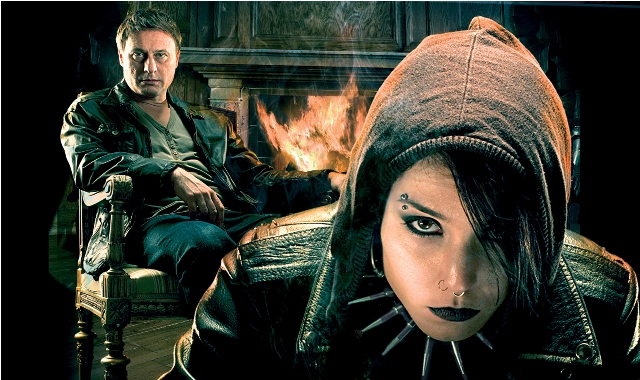

By Mike Wilmington Wilmington@moviecitynews.com
Wilmington on DVDs. Pick of the Week: Box Set. Stieg Larsson’s Dragon Tattoo Trilogy (Millennium Trilogy)
Steig Larsson’s Dragon Tattoo Trilogy (A.K.A. “The Millennium Trilogy”) (Four Discs) (Three and a Half Stars)
Also: Blu-ray, Extended Edition
Sweden: Niels Arden Oplev & Daniel Alfredson, 2009-2010 (Music Box)

Noomi
For all of you who want to catch up for the release this week of David Fincher’s American remake of Stieg Larsson’s The Girl With the Dragon Tattoo, here is the deluxe edition of the three original Swedish movies of the Larsson Trilogy (a.k.a. The Millennium Trilogy or the Dragon Tattoo Trilogy), based on the original Swedish novels. I like Fincher’s film: a first-rate, showy, icy, exciting crime/mystery neo-noir show. So far, I still like the original better, because I prefer hearing the story in Swedish. But you’ll want to see them both, unless violence or punk haircuts make you queasy.
In this trilogy of cinema thrillers, Noomi Rapace, as Lisbeth, the tattooed beyond-the-fringe investigator/suspected murderess/hacker heroine, and Michael Nyqvist as Mikael, her muck-raking leftist journalist/ally, tear off the scab-memories from some old social/political wounds (just this side of fascism) in this scorcher of a Swedish crime thriller trilogy: a mostly engrossing adaptation of the world-wide literary/bestseller trio by Steig Larsson — a leftist muckraker himself.
The Swedes have been unusually good at literary thrillers (like the Maj Sjowall–Per Wahloo police books), just as they’re also unusually good at rock ‘n roll, and tennis, and lingonberry jam, and movies. Ingmar Bergman is still their best movie-maker ever, and one of the world’s all-time best as well: one film writer-director who probably should have gotten the Nobel Prize for literature. (I‘m serious.) The Larsson books are, of course, what Graham Greene, another famous Nobel non-recipient, called “entertainments,“ crowd-pleasers mostly ignored by upper-echelon critics and prize-givers. But, sales-wise, they were world-wide phenomenons, and the writer’s own story is a fascinating one.
Like his hero (or maybe Lisbeth’s sidekick) Mikael, Larsson was a leftist Swedish investigative reporter himself, engaging in obvious literary wish-fulfillment. He wrote the three novels (and maybe more), but died before any of them could be published. Put out posthumously, the Larsson trilogy have all become spectacular international best-sellers, and opened up a real life mystery drama, as well an inheritance battle between his long-time girlfriend and his family.
Then came the (Swedish) movies and they’ve all been crowd-pleasers too, if not quite on the lofty financial plateau of the books. Many of the main actors thread their way through all, or most, of the trilogy: led by Nyqvist as the angst-ridden, determined Mikael and Rapace as the bewitchingly sullen and silent half-pint dynamo Lisbeth. The supporting cast includes brilliant, warm, lovely Lena Endre (of writer Bergman and director Liv Ullmann‘s great confessional-film Faithless), in the less flashy part of Mikael’s expose’ magazine colleague Erika; Georgi Staykov as Lisbeth’s brutal Russian defector father Alexander Zalachenko, Anders Ahlbom as her scum-sucking pedophiliac pig of a psychiatrist Dr. Peter Teleborian , and, the best of all the movie’s many malevolent male villains, Micke Spreitz as the huge, blonde assassin Ronald Neiderman, a behemoth who feels no pain and looks as if he could take on three Robert Shaws from From Russia with Love and send them all back to Moscow, mangled.
If you compare these movies to the recent British crime trilogy Red Riding, which is also based on a (far less popular) novel trilogy about social corruption and dark secrets written by novelist David Peace, adapted and scripted by Tony Grisoni for three different directors, a three-film-series and something of an unsung modern movie masterpiece, the Swedish films hold up very well. The Steig Larsson Millennium Trilogy may be sometimes less than an epic, but it’s far more than just an entertainment.
Includes: The Girl With the Dragon Tattoo (Sweden; Niels Arden Oplev, 2009) Three and a Half Stars. A terrific, smart Swedish mystery thriller. Based on the first Larsson novel, this one is about Nazis, serial killers, and cold-case murder mysteries on an isolated island — with an incredible performance by newcomer Rapace as Lisbeth, a black-leather, bisexual, computer expert on the trail of misogynists and monsters, and strong support from Nyqvist as Mikael, the Larsson-like left-wing investigative journalist (in temporary disgrace) and Sven Bertil-Taube as a rich industrialist who wants Mikael to solve the decades-old disappearance of his daughter.
Larsson’s book was originally called “Men Who Hate Women“ and the movie is, likewise, a full-throttle assault on violent sexism, to the extent that some viewers may get repelled and disturbed. But, like The Silence of the Lambs, this is a shocker that turns misogyny inside out. (In Swedish, with English subtitles, or English language version.)
The Girl Who Played With Fire (Sweden; Daniel Alfredson, 2009) (Three Stars)
Perhaps the least of the Larsson Trilogy, but still a corker, this movie delves into Lisbeth‘s fiery past, sends her on the run and introduces two sadistic and frightening villains, Lisbeth‘s own father (played by Staykov) and Spreitz as the blonde monster Neiderman. There’s a problem with the last two “Girl” stories though: Lisbeth is a damsel in distress and in jail or the hospital for much of their joint running time, and she’s more fun when she’s roaming free and kicking ass. (In Swedish, with English subtitles, or English language version.)
The Girl Who Kicked the Hornet’s Nest (Sweden; Alfredson, 2009 (Three Stars)
The third of the Steig Larsson movie adaptations — about Blomkvist, Lisbeth, and the rat’s nest of government corruption, private depravity and cold-blooded murder they uncover — is not quite as good as the first “Girl” movie (The Girl With the Dragon Tattoo), but as good or a little better than the second (The Girl Who Played with Fire), and overall, a gripping, entertaining, and unusually intelligent show.
Back is director Alfredson, who also worked on Girl Played with Fire, but not, suggestively, on Dragon Tattoo, which was directed by Niels Arden Oplev and written by Nikolai Arcel and Rasmus Heisterberg. Oplev may be a slicker director than Alfredson, but there also may be a script problem. Each of the unusually big Larsson books is arranged as a stand-alone murder mystery by itself, but they’re also part of a continuous saga, and by the end, there are so many strands to untie, that the last movie seems too rushed, even though it’s nearly two and a half hours long. (In Swedish, with English subtitles.)
Dragon Tattoo didn’t have to wrap everything up and audiences were probably so startled and/or delighted by their first look at Rapace’s hard-boiled anti-heroine Lisbeth that they didn’t care. The Girl Who Kicked the Hornet’s Nest also mixes up thriller and romance movie genres, though in this case, the romance seems to be doomed: Mikael‘s apparently unrequited crush on Lisbeth, scourge of an astonishing gallery of vile male rapists, pedophiles, fascists and murderers. Mikael, the relentless reporter, has the same soft eyes as Erika, but Lisbeth’s glare pierces like a knife, and what they share is almost like Brief Encounter, crossed with a James Bond movie and All the President‘s Men. (In Swedish, with English subtitles, or English language version.)
Summary: As for comparisons between the original Girl with the Dragon Tattoo and the remake, directed by Fincher, also set in Sweden (but spoken in English), with Daniel Craig as Mikael and Rooney Mara as Lisbeth, well, you owe it to yourself to see Noomi and her tattoo and mohawk first. If Ingmar Bergman deserved a Nobel Prize for Literature, Noomi Rapace deserves a Palme d’Or for Punk. And Larsson deserves prizes of some kind in Heaven or whatever for the ones he just missed on Earth — as well as thanks from mystery and mystery-movie buffs everywhere. Skoll!
Extras: Both the English and Swedish Language Versions; Documentary Millennium: The Story; Interviews with Nyqvist, Rapace, and others from the cast and crew; Fight scene anatomized; Trailers. (Note: The Extended Edition, nine hours plus long, will be reviewed here as soon as I get and screen it.)
















Is the Millenium Trilogy DVDs of the original uncut version or edited versions? I understand that earlier releases were cut and incomplete.